Highlights Cache discoveries, Museum of London and The Book of Mormon.
With a show booking for this evening, John
opted to stay at Hammersmith and blob out while I went into the city. I had 2
aims, a cache I had been wanting to find and a visit to the Museum of London.
They were not in that order of priority, but in order of doing because of
transport and timing.
I took a late rush hour tube to Chancery Lane
and for the first time met the instruction that the gates were open and people
didn’t need to tag out if their next journey would be a return from the same
station. I did because I had different plans.
I stopped here to find a virtual cache that was going to take me
to a pub that opened in 1546. The listing, by the person who set the cache, describes
it all.
“This pub is straight out of Dickens
and must be a strong contender for "Quaintest pub in London". This
timbered pub was built in 1546 and is still in use today. Apparently this is
the second oldest pub in London. This is my favourite pub consisting of a
fascinating building, excellent beer and two cosy bars. I often came here when
I worked in the area but you wouldn't normally find it unless someone brought
you here. If you fancy a pint then you'll have to visit during the week because
pubs in the City of London (which is a distinct area inside London city) are
closed at the weekend and Bank Holidays. Over the last 500 years, much bigger
buildings have been built all round this small pub until it was completely
surrounded and accessible only down two small alleyways.
It is quite literally
an oasis within the city and when you find it then it feels like you are hidden
away - for Harry Potter fans this is like a real life Diagon Alley leading to
The Leaky Cauldron pub.”
I had no problems finding it because I knew what I was looking for, but
it is certainly down a very narrow lane. Of course I was here far too early to
see if the bars were as cosy as suggested but it was a real piece of history in
the middle of new buildings.
The next stop was an unexpected highlight. The listing had suggested
that a church also in the same area was worth a visit.
St Etheldreda's church was built around 1250 as a
"double-decker" church ie one chapel on top of the other. It is a
very interesting building which has survived the Great fire of London, the
Reformation (Henry VIII), a direct hit from a bomb in the Blitz of the Second
World War and every other threat to its existence. It is the oldest Roman
Catholic church in the country and one of only two surviving buildings from the
period of Edward I. The main chapel
(upstairs) has the largest stained glass window in London. and downstairs (the
crypt) has an interesting model of the original extent of the buildings around
the church.
The street it is on is theoretically still part of Cambridgeshire
although it was not clear in the listing why. However, there was a sign outside
that said it is the Ancient Chapel of the Bishops of Ely, built 1250-1290 and
restored to the old faith in 1874.
I had not read the listing in advance so the window was a very pleasant surprise.
The church was open with only 2 others inside so it was a peaceful visit. One
of the first things I saw was a statue of Mary with a plaque saying it was
donated in memory of the Early Canterbury Settlers in New Zealand, so I thought
of Pete and Ailsa. There were 2 large stained glass windows, as well as a
series on the side walls, so I was delighted to have visited this church. I was
even more pleased with my timing as there was a large tour group about to enter
as I left.
My walk to the Museum of London then took me through the Smithfield
Market area where there were streets like Poultry Lane, until I got to an area
where the road was closed, with a number of people with fliers redirecting us
all. It only added a minute or two to the trip.
I was keen to go the Museum of London, having good memories of how well
it is set out from 20 years ago, visiting with the whole family. I also
discovered after I arrived there were 2 caches based on information found here,
so that added extra interest to parts.
The Museum is set out as a walk through London over time, starting
before there were people here. I noticed older people were more interested in
this part and displays of objects uncovered, often from dredging the Thames or
in the process of rebuilding in the city. There were a few school groups here
and they were more interested in the later galleries with more focus on people.
My highlights by Gallery
London before London: Flints and clubs from 3300 BC or earlier,
Shepperton woman from 3600-3100 BC, coins from AD10.
Roman: The first bridge across the Thames at the same site as London
Bridge and the reconstruction of the waterfront, various mosaics and seeing the
London Wall out the window.
Medieval: A medieval St Paul’s Cathedral model of the building as in the
1320’s.
War, Plague and Fire: The Copper Plate Map, Great fire paintings,
Playhouse information (I hadn’t realised that Shakespeare’s death marked the beginning
of the end of London’s outdoor theatres).
Expanding City: The ladies fans, wide dresses, and a comparative of the
lives of the rich and poor.
Victorian Walk: A series of shops etc with original fronts and fittings
from buildings demolished in the 1960s, especially the glass showroom and stationers,
which reminded me of Liz and her collections.
People City: An early motorisedTaxi, Charles Booth’s map of poverty ( he
researched all areas of the city and colour coded them as semi criminal, very
poor, poor, mixed, comfortable, well to do and wealthy).
World City: Seeing history I have lived through such as Mary Quant
through to the London Olympics.
The cache
based on the museum caused me a few issues at the end. I will just repeat my
log. [SoBad is our caching name]
“Mrs SoBad went solo to the
Museum to let SoBad have a quiet day. She found it easier to view the galleries
then go back to find the information required, which often drew her attention
to other features. Sat and worked out the values and got a green tick. Sat near
GZ trying to get the GPS and phone to settle so rechecked the checker for a
quick find. However, the cache was too tight for her fingers so she had to ask
a random passer by to open it - having moved a bit from GZ to ask. It then took
too long to fiddle with the log and get it out and back in. At that stage
someone arrived near GZ, but she could manoeuvre herself to replace it unseen.”
I then headed to find a couple of caches we had run out of time for on a
previous trip. One was at Finsbury Circus, an elliptical open space where there
were still people having late lunches or just sitting. The other was a few
hundred metres away and the end of the cache based on the Kindertransport
statue we saw at Liverpool St station when waiting for Katherine to take us up
to the ‘Duck and Waffle’.
I tubed back to find John had had the peaceful day he wanted. Then we
headed into Piccadilly by bus to go to ‘the Book of Mormon’. We had time before
this for a light meal and a look at the souvenir shops (no purchases). Then we
joined the long line to have a very token bag check, just in time to take our seats
for the show.
I had heard that ‘the Book of Mormon’ was well worth seeing. Katherine said
it is her favourite show but was not sure it would be to my taste although she
thought John would enjoy it. She probably got it the wrong way around as I
found it hilarious and John thought it was a bit odd, but enjoyable. He did
find the theatre very hot near the end. It certainly was full. ‘Les Mis’ is still my favourite show, but this
would be up there, although ‘Bat Out Of Hell’ was better for me.
We bussed back to find Katherine waiting for her tea to be delivered. We
had a catch-up about our various days (she had her last exam day today, and had
after-work drinks) and then we went to bed.

 London, England, United Kingdom
London, England, United Kingdom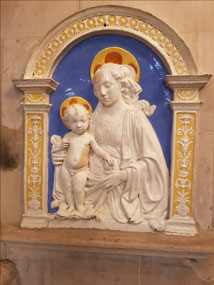
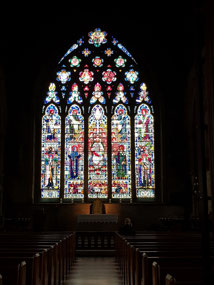
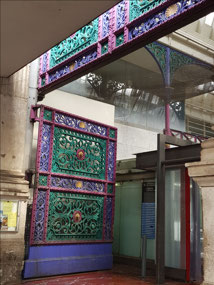
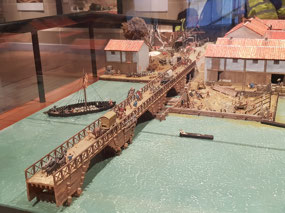
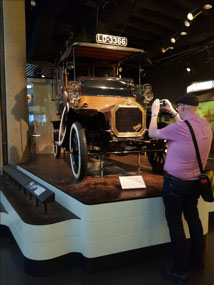




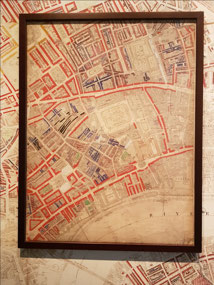
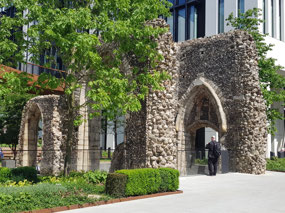
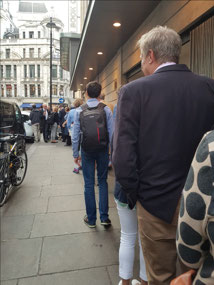
2025-05-22